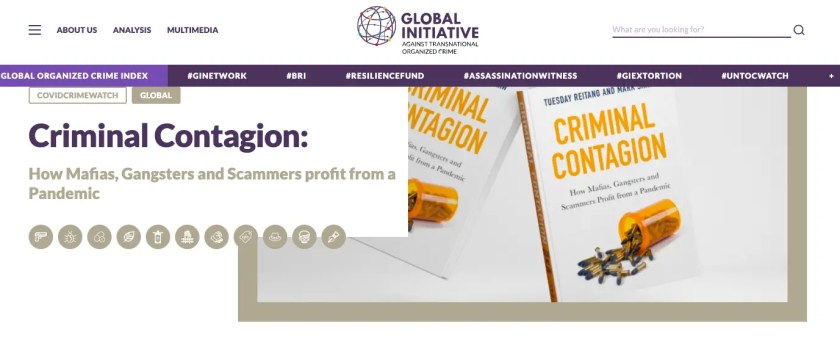Criminal Contagion: How Mafias, Gangsters and Scammers profit from a Pandemic is a recent study produced by the Global Initiative against Transnational Organised Crime.
As the title suggests the book is an exploration of how Organised Crime has exploited opportunties during the Pandemic, and been thriving as a result.

As lockdowns closed down businesses, Organised Crime stepped up and transformed their practices to take advantage of the opportunities provided with people losing their jobs and just the general fear and confusing.
How organised crime exploited the pandemic
There was a massive increase in Cyberscams targeting both businesses and individuals offering such things as free Coronavirus testing kits and some of the government sites offering financial helps were cloned by criminal organisations to phish for people’s personal details.
There was even one website which offered ‘Coronavirus anti virus software’ which you could download to protect you from Coronavirus – playing on people’s fear and confusion (NB people did actually fall for this). Of course this was just a virus which extracted information from any computer it was downloaded to.
Online porn also increased massively – along with the exploitation of people uploading ‘home made content’ – regulating this kind of thing is difficult, to say the least.
One case from South Africa outlined a case where local gangs were going around houses telling people that cash was one of the main things that was spreading the disease and that people should hand over their cash so it could be cleaned.
Mafia Loan sharking also increased – with loan sharks preying on the many people who lost their jobs during the Pandemic.
The drug trade, however, remained relatively unchanged by the Pandemic, which is surprising given the closing down of trafficking routes. This was because many organisations had large stockpiles of drugs ready to sell, and a lot of health shipments related to the Pandemic (PPE shipments for example) actually contained drugs.
On the street level, local drug dealers dressed as health officials so they appeared as legitimated public officials out and about during lockdowns.
The Pandemic also put extra pressure on Criminal Justice Systems around the world – courts closed, and public order officials were hardest hit with sickness as they were on the frontline, compromising their ability to police the pandemic.
There was also a mass release of criminals from prisons as these were a main vector of transmission of the virus, including four major Mafia bosses in Italy.
In many countries where there is massive corruption, a lot of the funds released for public health made their way to private hands.
Source: I took this summary from this most excellent Thinking Allowed Podcast. (September 2021).
Relevance to A-level Sociology
This is fantastic resource for students studying the Crime and Deviance module in their second year!
Please click here to return to the homepage – ReviseSociology.com







